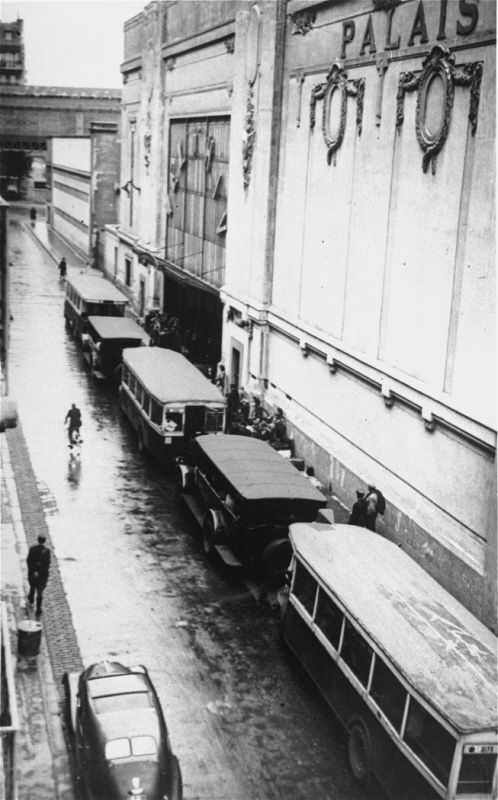
Police Round Up Paris Jews—Deportations Feared
French police round up thousands of Jewish men, women, and children throughout Paris and detain them under appalling conditions in the Vélodrome d'Hiver (Winter Cycling Track).
View newspaper articlesThe Vélodrome d'Hiver (or "Vél d'Hiv") roundup was the largest French deportation of Jews during the Holocaust. It took place in German-occupied Paris on July 16–17, 1942.
In order to guarantee the participation of the French police in the roundups, Nazi officials agreed to focus on foreign and stateless Jews, thus initially sparing the French Jewish population from deportation. Beginning in the early hours of July 16, French police rounded up thousands of men, women, and children throughout Paris. By the end of the day, the police had taken 2,573 men, 5,165 women, and 3,625 children from their homes. The roundup continued the following day, but with a much smaller number of arrests.
Approximately 6,000 of those rounded up were immediately transported to Drancy, in the northern suburbs of Paris. Drancy was at that point a transit camp for Jews being deported from France. The rest of the arrestees were detained at the Vélodrome d'Hiver (Winter Cycling Track), an indoor sporting arena in Paris's 15th arrondissement. Some 7,000 Jews, among them almost 4,000 children, were crowded together in the sports arena. There was scarcely space to lie down and the incarcerated Jews faced appalling circumstances. No arrangements had been made for food, water, or sanitary facilities. Only two physicians a shift were allowed in to treat the internees. The glass ceiling of the arena contributed to a stifling environment by day, as all ventilation had been sealed to prevent escape, and led to chilly temperatures at night.
After five days, Jews incarcerated at the Vél d'Hiv were transferred to other transit camps outside Paris, including Drancy, from which they were transported to concentration camps and killing centers in the east. At the end of July, the remaining adults were separated from their children and deported to Auschwitz. Over 3,000 children remained interned without their parents until they were also deported, among adult strangers, to Auschwitz.
Learn More about this Historical Event
- The Vélodrome d'Hiver (Vél d'Hiv) Roundup (Encyclopedia Article)
- Paris (Encyclopedia Article)
- France (Encyclopedia Article)
Bibliography
Klarsfeld, Serge. Vichy–Auschwitz: Le rôle de Vichy dans la Solution Finale de la question Juive en France—1942. Paris: Fayard, 1983.
Lévy, Claude, and Paul Tillard. Betrayal at the Vél d'Hiv. New York: Hill and Wang, 1969.
Lévy, Claude, and Paul Tillard. La Grande Rafle du Vél d'Hiv (16 juillet 1942), Nouvelle édition. Paris: Editions Robert Laffont, 1992.
Paxton, Robert O. Vichy France: Old Guard and New Order, 1940–1944. Columbia University Press, 1972.
Search tips
These dates and keywords are associated with this historical event.